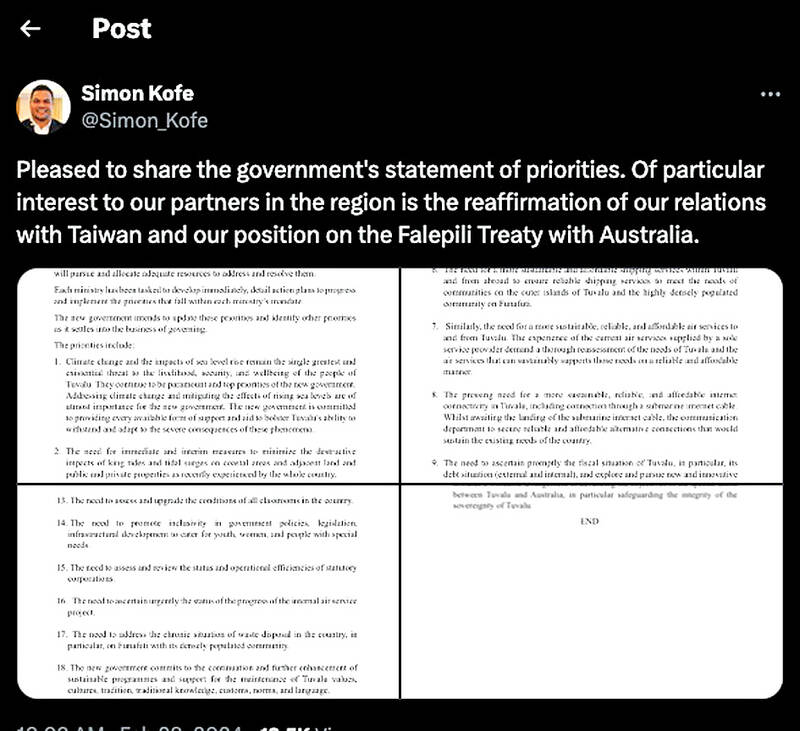Tuvalu’s new government yesterday reaffirmed that it would continue to formally recognize Taiwan, instead of switching its allegiance to China following a national election last month.
“The new government wishes to reaffirm its commitment to the long-term and lasting special relationship between Tuvalu and the Republic of China, Taiwan,” said a government document posted on X by Tuvaluan Minister for Transport, Energy, Communication and Innovation Simon Kofe.
The new government “intends to reassess options that would strengthen and lift it to a more durable, lasting, and mutually beneficial relationship,” said the document, titled “Statement of Priorities for the New Government of Tuvalu after the National General Elections on 26 January 2024.”

Photo: screen grab from Simon Kofe’s X account
Tuvalu, a Pacific Island nation of about 11,200 people, is one of Taiwan’s three remaining Pacific allies, after Nauru last month switched recognition to Beijing, which had promised more development assistance.
“Of particular interest to our partners in the region is the reaffirmation of our relations with Taiwan and our position on the Falepili Treaty with Australia,” Kofe wrote.
A former Tuvaluan minister for justice, communication and foreign affairs known for his Taiwan-friendly stance, Kofe was yesterday appointed to his new role by new Tuvaluan Prime Minister Feleti Teo.
Kofe most recently visited Taiwan in May last year.
A former attorney general and fisheries official, Teo was elected on Monday, after a general election closely watched by Taiwan, China, the US and Australia, amid a geopolitical tussle for influence in the South Pacific.
After taking office, Teo met with Ambassador to Tuvalu Andrew Lin (林東亨), affirming that “the diplomatic alliance between Taiwan and Tuvalu is solid and that all sectors of Tuvalu share a long-standing consensus on supporting official bilateral relations,” the Ministry of Foreign Affairs said in a statement.
“The two governments will continue to jointly promote substantive cooperation projects aimed at enhancing the welfare of both their peoples,” the statement quoted Teo as saying.
In Taipei, ministry spokesman Jeff Liu (劉永健) on Tuesday said that the government is expected to invite Teo to attend president-elect William Lai’s (賴清德) inauguration ceremony on May 20.
There were concerns before Teo was appointed on Monday that Taiwan’s ties with Tuvalu could be in jeopardy.
Former Tuvaluan minister of finance Seve Paeniu, who was a contender for the country’s leadership, last month said that Tuvalu’s ties with Taiwan “need to be debated and reviewed in the new parliament.”
Tuvaluans wanted more financial support from the international community to help the island nation address climate change and other issues, Paeniu said.

A magnitude 5.6 earthquake struck off the coast of Yilan County at 12:37pm today, with clear shaking felt across much of northern Taiwan. There were no immediate reports of damage. The epicenter of the quake was 16.9km east-southeast of Yilan County Hall offshore at a depth of 66.8km, Central Weather Administration (CWA) data showed. The maximum intensity registered at a 4 in Yilan County’s Nanao Township (南澳) on Taiwan’s seven-tier scale. Other parts of Yilan, as well as certain areas of Hualien County, Taipei, New Taipei City, Taoyuan, Hsinchu County, Taichung and Miaoli County, recorded intensities of 3. Residents of Yilan County and Taipei received

Taiwan has secured another breakthrough in fruit exports, with jujubes, dragon fruit and lychees approved for shipment to the EU, the Ministry of Agriculture said yesterday. The Animal and Plant Health Inspection Agency on Thursday received formal notification of the approval from the EU, the ministry said, adding that the decision was expected to expand Taiwanese fruit producers’ access to high-end European markets. Taiwan exported 126 tonnes of lychees last year, valued at US$1.48 million, with Japan accounting for 102 tonnes. Other export destinations included New Zealand, Hong Kong, the US and Australia, ministry data showed. Jujube exports totaled 103 tonnes, valued at

TRUST: The KMT said it respected the US’ timing and considerations, and hoped it would continue to honor its commitments to helping Taiwan bolster its defenses and deterrence US President Donald Trump is delaying a multibillion-dollar arms sale to Taiwan to ensure his visit to Beijing is successful, a New York Times report said. The weapons sales package has stalled in the US Department of State, the report said, citing US officials it did not identify. The White House has told agencies not to push forward ahead of Trump’s meeting with Chinese President Xi Jinping (習近平), it said. The two last month held a phone call to discuss trade and geopolitical flashpoints ahead of the summit. Xi raised the Taiwan issue and urged the US to handle arms sales to

BIG SPENDERS: Foreign investors bought the most Taiwan equities since 2005, signaling confidence that an AI boom would continue to benefit chipmakers Taiwan Semiconductor Manufacturing Co’s (TSMC, 台積電) market capitalization swelled to US$2 trillion for the first time following a 4.25 percent rally in its American depositary receipts (ADR) overnight, putting the world’s biggest contract chipmaker sixth on the list of the world’s biggest companies by market capitalization, just behind Amazon.com Inc. The site CompaniesMarketcap.com ranked TSMC ahead of Saudi Aramco and Meta Platforms Inc. The Taiwanese company’s ADRs on Tuesday surged to US$385.75 on the New York Stock Exchange, as strong demand for artificial intelligence (AI) applications led to chip supply constraints and boost revenue growth to record-breaking levels. Each TSMC ADR represents